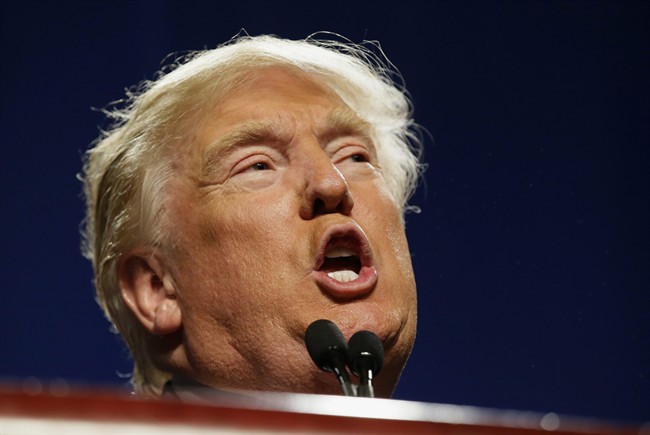WASHINGTON – Some Republicans are so distressed by the thought of Donald Trump as their presidential nominee that they’ve turned to a higher power for electoral guidance.

“I have prayed about it,” said Kathy Hughes, a retired South Carolina schoolteacher who supports Sen. Ted Cruz.
“I don’t think I could vote for him. … Never. (And) never have I voted Democrat… I guess I would stay home. That would be a first for me. I am 68 years old and I have voted in every election.”
Such unusually strong concern points to an intra-party rift that could deepen after Tuesday, should Trump sweep a dozen primaries and move closer to the nomination.
The decades-old Republican coalition shows signs of cracking.
Trump is the human wedge jammed into its fault lines. Some social conservatives are dismayed by his habit of swearing in speeches and past support for abortion; libertarians are appalled by his celebration of aggressive policing and torture; business titans are unnerved by his denunciation of trade deals and job outsourcing.
Hughes worries about Trump’s authoritarian language. Just the other day, he suggested making it easier to sue media who write unfair stories. He proposes targeting tariffs against companies that open plants overseas.
As a religious person, she’s also turned off by his constant bragging about money, his wavering on abortion and his salty language: “I think he’s vulgar.”
- Alberta to overhaul municipal rules to include sweeping new powers, municipal political parties
- Canada, U.S., U.K. lay additional sanctions on Iran over attack on Israel
- No more ‘bonjour-hi’? Montreal mayor calls for French only greetings
- Trudeau says ‘good luck’ to Saskatchewan premier in carbon price spat
A Super Tuesday sweep would only stoke the already burning conversation topic at Republican gatherings these days: What to do if Trump becomes the nominee — support him, vote Democrat, stay at home, or back a third-party candidacy?
READ MORE: Donald Trump mocked by Nathan Lane, Matthew Broderick in ‘Producers’ parody
At a Marco Rubio rally another party activist says he’ll be seeking spiritual guidance, should Trump be crowned at this summer’s Republican convention.
“The first thing I’d have to do on July 21 (after the convention) is pray,” said Bob Barnwell, who sits on a precinct committee.
“People are saying, ‘Well, I would have to vote for Trump.’ I’d have to think about that. … I’m not really sure I would work for him, or give to the campaign.”
The truth is the vast majority of Republicans say they’d support Trump, should he be the standard-bearer. He could also succeed at bringing in new voters as Ronald Reagan did.
Early signs point to the possibility of a new coalition. Thousands have changed their political affiliation in Massachusetts, apparently to participate in the Republican primary. In New York, the Post reported on an internal poll that supposedly shows Trump competing in New York state — which no Republican has won since Reagan.
Still, numerous data points offer worrisome signs and people like Marco Rubio are frantically pointing at them — he says a Trump nomination could mean the destruction of the GOP.
A Bloomberg poll last month said only half of non-Trump-supporting Republicans would back him in a general election, which would be a catastrophic loss of votes.
The site fivethirtyeight.com examined whether this could be the historical unravelling of a partisan coalition — reminiscent of how the Democrats’ alliance of northern liberals and working-class southerners blew up in the 1960s.
A long-time Republican who helped build the party in the south says these are perilous times.
READ MORE: Photographer choked, slammed to ground by Secret Service at Trump rally
Fifty years ago this month, a young Harry Lee Poe scandalized his South Carolina neighbours by coming out as a Republican. He was tired of the corruption that had seeped into the one-party state governed by Democrats.
He’s written a book, “Total Commitment,” about the rag-tag organizational team led by youngsters who in 1974 helped elect a Republican governor in the state for the first time in a century.
The shift happened in stages: first, segregationist senator Strom Thurmond left the Democrats in protest over civil-rights legislation; then the anti-communist hawks joined in; the business community followed; rural areas were next; and by the 1970s the Republicans were a southern powerhouse.
He fears it’s all coming apart now.
“It is a pivotal moment… If (Trump) got the nomination, I could see a situation where a lot of Republicans just stay home,” said Poe, who preceded the legendary organizer Lee Atwater as chair of the state’s college Republicans.
“If it’s not handled well it, could all just blow up.”
He’s now a religious scholar and hasn’t been involved in politics for years. But he offers two bits of advice to his party: Focus on people’s bread-and-butter concerns, like jobs and college tuition.
And nominate someone with governing experience.










Comments